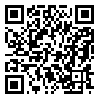Volume 12, Issue 45 (6-2018)
Research on Addiction 2018, 12(45): 91-112 |
Back to browse issues page
Download citation:
BibTeX | RIS | EndNote | Medlars | ProCite | Reference Manager | RefWorks
Send citation to:



BibTeX | RIS | EndNote | Medlars | ProCite | Reference Manager | RefWorks
Send citation to:
Ebrahimy I, Zeinali A. The Model of Causal Relationship between Parenting Styles, Attachment Styles, and Self-Regulation among Drug Dependent Individuals. Research on Addiction 2018; 12 (45) :91-112
URL: http://etiadpajohi.ir/article-1-1682-en.html
URL: http://etiadpajohi.ir/article-1-1682-en.html
Islamic Azad University, Urmia Branch
Abstract: (7019 Views)
Objective: The present study aimed at investigating the causal relationship between parenting styles, attachment styles, and self-regulation among drug dependent individuals in Urmia city. Method: In this correlational/ descriptive research, the number of 449 addicts was chosen through multi-stage cluster sampling method from among the addicts who had referred to addiction treatment clinics in Urmia city. They then filled out the questionnaires, namely Parenting Styles Questionnaire (Zeinali, Sharifi, Enayati, Asgari, & Pasha, 2012), Self-Regulation Questionnaire (Carey, Neil, & Collins, 2004), and Attachment Styles Questionnaire (Van Oudenhoven, Hofstra, & Bakker, 2003). The collected data were analyzed by presenting two models through path analysis in AMOS software. Results: The results of this study showed that authoritarian and neglectful parenting styles have a significant negative effect on self-regulation; and authoritative and permissive parenting styles have a significant positive effect on self-regulation in fathers and mothers' model (P <0.001). In both models, authoritative and permissive styles had a significant positive effect on secure attachment style (P <0.001). The effect of authoritarian and neglectful styles on the secure attachment style was not significant in fathers' model, but it had a significant negative effect on the mothers' model (P <0.05).
The effect of permissive style on secure attachment style was negative in both models; the effect of neglectful style on insecure attachment style was positive in both models; the effect of authoritarian style was non-significant in both models. In addition, the effect of authoritative style on insecure attachment was negative in fathers' model while it was non-significant in mothers' model. The effect of insecure attachment on self-regulation was negative in both models (P <0.001) and the effect of secure attachment on self-regulation was non-significant in both models. Conclusion: Insecure attachment was revealed to be a significant mediator between parenting styles and self-regulation among addicts. Authoritative and permissive parenting styles increase self-regulation in them through the reduction of insecure attachment; and authoritarian parenting style decrease self-regulation in addicts through the increase of insecure attachment.
Type of Study: Research |
Subject:
Special
Received: 2018/03/10 | Accepted: 2018/06/4 | Published: 2018/07/10
Received: 2018/03/10 | Accepted: 2018/06/4 | Published: 2018/07/10
| Rights and permissions | |
 |
This work is licensed under a Creative Commons Attribution-NonCommercial 4.0 International License. |





